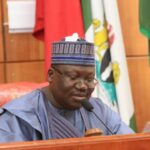By: Adefila Kamal
For those familiar with the context and content of Napoleon Bonaparte’s timeless argument that “a man will fight harder for his interests than his rights”, the recent uproar over the recent policy announcements by the Central Bank of Nigeria (CBN), were absolutely expected. Whereas the fragility of the Nigerian state politically and economically would dictate that caution be applied in public engagements by the topmost echelons of Nigerian society, the supremacy of “interests” over and above “rights” in driving human behavior was on display in the form of brazen misinformation and twisting of facts to preserve the hold of a few at the expense of the majority.
It is expected that every policy of note will meet with some form of resistance either borne out of malice or ignorance, but it was rather shocking that sections of the Nigerian ruling class would rather burn down the house than have it cleaned and more habitable for all. No sooner than the policy announcement by the CBN was made, tents were pitched both for and against, with very little consideration for the actual merits and demerits of the policy. Rather than seeking the best course of action to benefit the Nigerian economy public discourse on the matter became dominated by blackmail, personality attacks, baseless accusations and conspiracy theories of the most virulent and vitriol filled iterations, as an economic proposition quickly degenerated into a political popularity contest.
The vested interests holding the Nigerian economy to ransom have for decades perfected the act of couching the need to maintain their unearned privilege as an invitation to suffering for the Nigerian people and anarchy. In the eight years of the Buhari administration, the CBN, under the leadership of Godwin Emefiele, has put itself on the hook in seeking solutions to the multi-dimensional and multi-level challenges confronting the Nigerian economy. Government revenues took a hit of near cataclysmic proportions, following the fall in oil prices in 2014 and the increasing cases of crude oil theft and vandalism which has seen oil production drop from the heights of 2.2million barrels per day. Things degenerated to the point where the entire federation was on the brink of collapse with states and local governments unable to meet their most basic financial obligations of paying staff salaries.
The CBN stepped in and supported the federal government to make a bouquet of provisions of loans, grants and refunds to the subnational governments to meet their obligations and keep their operations going. Further the CBN supported the federal government in the quest to diversify the Nigerian economy and shore up the position of the Nigerian currency by supporting the agricultural sector on a scale never before seen in the history of Nigeria through the Anchor Borrowers Programme (ABP) and other support programmes under the Nigeria Incentive-Based Risk Sharing System for Agricultural Lending (NIRSAL) and the NIRSAL Microfinance Bank Limited. These policy interventions had effects on the poorest segments of society who had to adjust to the new realities in the economy, and the CBN came under the spotlight on many of its policy choices and programmatic interventions.
It is rather curious that none of CBN’s interventions generated as much uproar as the recent announcement by the CBN, in exercise of its constitutionally backed power to manage the nation’s monetary policy to control inflation, that it would be redesigning the higher denominations of the Nigerian currency and limiting cash withdrawals. No sooner had this announcement been made than the conspiracy theories went to town with wild stories about the CBN governor supporting one candidate over another and many others that bore no closeness to reality.
One such conspiracy theorist was Honourable Muhammad Gudaji Kazaure, the member of the House of Representatives from Jigawa State, who is better known for his comic takes on national issues and dramatic contributions to debates on the floor of the House. In typical Nigerian fashion Hon. Kazaure was catapulted from the stuff of jokes to the front page of major news platforms over a claim that Godwin Emefiele had superintended over a heist of 89trillion naira fees accruing from stamp duty collection by the CBN. It was equally strange that the Nigerian media did not fact check the claims made by the Honourable member, but went to town in a manner akin to wanting to give a dog a bad name to hang it, even though one would have expected that Nigerians would be wary of humongous figures being put in the public domain with claims of stealing by officials which end up coming to naught, but this particular episode stayed long enough in the public domain to elicit reactions and counter reactions.
Summons flew in from the National Assembly for the CBN governor, while various groups emerged calling for the sack of the CBN governor and others calling for him to remain. The Presidency was quick to clarify the issues with the stamp duty regime and the steps taken by President Muhammadu Buhari to right the wrongs in the old system, and clarifying that a committee was constituted in error and that the issue had not been abandoned but would be resolved soon.
The DSS came into the fray, approaching a High Court in Abuja to secure a detention order against one “Godwin Emefiele” over allegations of financing terrorism. The presiding judge, who happened to be the Chief Judge of the Federal High Court, Justice John Tsoho, promptly struck out the motion for lacking in detail to convince the court, while also maintaining the caveat that the DSS had a right to carry out its duties. A second court has since ruled, in a matter taken up by a civil society organization, that “there is a procedure for the removal of the CBN Governor”, a position held by the EFCC which is also a respondent in the matter, and that the continued harassment of the CBN Governor is needless and unlawful.
A cursory look at the uproar generated by an institution of state carrying out its statutory function, would reveal that there is a high level gang up against the policy of the CBN which has prompted these characters to deploy all possible means to intimidate Mr. Emefiele into submission or even worse cause so much chaos that his position would no longer be tenable.
For the political class in Nigeria, this may seem to be another test of strength and popularity, but a continued casting of aspersions on the person of the CBN and his office would have far reaching consequences for Nigeria both locally and internationally. An economy is built on confidence by all players in the fact that the markets therein are based on rules that are beyond reproach and manipulation, and any serious dent on the credibility of the regulatory bank and lender of last resort could see the entire superstructure crumble. Nigeria being a member of an international monetary system through which government carries out much needed export and import transactions, cannot afford to be sanctioned, a threat that is real should the CBN governor continue to be the subject of an obvious witch-hunt.
There has to be a limit to power mongering and, in the interest of the greater good of Nigeria’s continued corporate existence, the red lines have been crossed and it is time to return to the fundamentals of our nationhood, which is bigger than the sum of its component parts. It is time for us to return to politicking with an eye on collective prosperity rather than preserving fiefdoms with ever dwindling influence which is being eroded by non-state actors. All efforts must be geared towards coming up with sustainable solutions that reverse the current trend in our monetary management. A situation where all shades of non-state actors operate with impunity must be reversed and an important element facilitating these often violent crimes is illicit financial flows, which cannot be tracked as the CBN admitted to in explaining the rationale behind the currency note redesign and cash withdrawal limits policy.
A number of questions arise from the uproar against the CBN from the recent policy announcement: who are the enemies of Nigeria that would kick against a quest to restore sanity to currency management, for better tracking of transactions? Are the poor really going to be worst hit by the measures by the CBN in an economy where the vast majority live on less than 2US Dollars per day? Who is afraid of a monetary system where the authorities are able to track financial flows to control inflation and criminal activities that require funding to sustain? Who really is afraid of a Nigeria that works for the majority of Nigerian people? Who really is afraid of the amiable Godwin Ifeanyi Emefiele, who has taken on the challenge of a much needed and long overdue financial system reform? Surely we all can do better in protecting critical public institutions such as the CBN in line with the spirit and letter of the CBN Act of 2007.
Adefila Kamal is the National President, Civil Society Network for Good Governance, an umbrella body of civil society organizations in Nigeria



